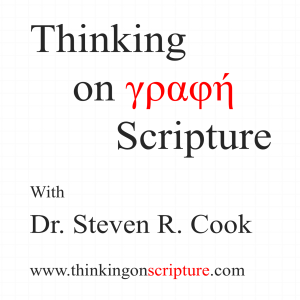
Sunday Nov 03, 2019
Habakkuk 3:1-19
Habakkuk became fearful at the Lord’s reply to his questions (Hab 3:1-2a), knowing God was bringing judgment both upon Judah and Babylon, and this prompted him to write a prayer-song of praise to God for His past and future acts of judgment. Habakkuk petitioned the Lord: 1) to do a visible work of judgment in his day, and 2) to remember mercy in judgment (Hab 3:2b). In the remainder of the chapter, Habakkuk set forth a history lesson of God’s works when He delivered His people from the Egyptian bondage. This history lesson assured Habakkuk that God would also deliver His people from Babylonian oppression. The prophet recalls when God entered into a covenant with Israel at Mount Sinai, where He brought them after bringing plagues of judgment upon Egypt. God’s judgment upon Egypt when He delivered His people caused the other nations to tremble in fear (Hab 3:3-7; cf. Ex 15:14-16; Deu 2:25; Josh 2:9). During His acts of deliverance, God’s anger and wrath were said to be against the rivers and sea (Hab 3:8-9), which most likely refers to the Nile (Ex 7:20-21), Jordan (Josh 3:14-17), and Red Sea (Ex 14:15-16; 15:8). God is pictured as a Warrior whose “bow was made bare, [and] the rods [arrows] of chastisement were sworn” (Hab 3:9). At this awesome picture, “The mountains saw You and quaked; the downpour of waters swept by. The deep uttered forth its voice, it lifted high its hands” (Hab 3:10). Habakkuk’s language is comparable to Psalm 77:16-18, which poetically describes God’s deliverance of Israel from Egypt. The prophet then describes the time when God caused the sun to stand still when Joshua was fighting to take the land (Hab 3:11; cf. Josh 10:12-13), and then as He conquered the nations as His people entered Canaan (Hab 3:12). Habakkuk then pictures God as a Warrior who delivers His people and His anointed king, perhaps from the Babylonians (Hab 3:13a). After the Lord strikes down “the head of the house of the evil to lay him open from thigh to neck” (Hab 3:13b), He takes his weapons from his dead body and uses them to defeat “the head of his throngs” (Hab. 3:14a). And who are the defeated ones? Likely the Babylonians who “stormed in to scatter us; their exultation was like those who devour the oppressed in secret” (Hab 3:14b). It was upon these that the Lord “trampled on the sea with Your horses, on the surge of many waters” (Hab 3:15). If this interpretation is accurate, then the statement would be proleptic, seeing the future destruction of Babylon as so certain, that the prophet speaks of it as already having come to pass. After reflecting on God’s past judgments and deliverances (Hab 3:3-15), he returns to the present situation and trembles at the prospect of the Babylonian invasion (Hab 3:16a), in which he waits “quietly for the day of distress, for the people to arise who will invade us” (Hab 3:16b). Though Habakkuk anticipated judgment, which included famine upon the land (Hab 3:17), yet, he declares, “I will exult in the LORD, I will rejoice in the God of my salvation” (Hab 3:18). Though he cannot stop the trouble that’s coming, he fixes his hope on the Lord who is in control of these events. Here, Habakkuk is doing what pleases the Lord, as he lives by faith in God (Hab 2:4b). With his faith fixed completely on the Lord, he states, “The Lord GOD is my strength, and He has made my feet like hinds’ feet, and makes me walk on my high places” (Hab 3:19a). He concludes his prayer-song by sending it to “the choir director, [to be played] on my stringed instruments” (Hab 3:19b).
No comments yet. Be the first to say something!